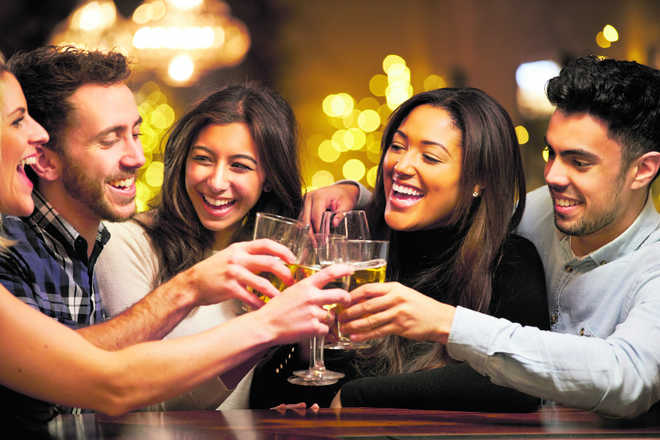A popular, foot-tapping number from a Bollywood film, Mere Dad Ki Maruti aptly describes the undying relationship between daru (liquor) and Punjabis. The song, ‘gaan da mauka hove, khan da mauka hove, hove koi marriage ya fir koi roka shoka hove, peen di capacity large rehndi hai, Punjabiyan di battery charge rehndi hai,’ minces no words in expressing how the community has developed an excellent drinking capacity for every occasion. In fact, this is one attribute they are unabashedly boisterous about. Particularly in North India, any celebration, even breakup, is incomplete with a toast! Liquor is the prerequisite to any celebration, so much so they tend to overlook every other detail in an invite and head straight for the cocktail section. And in case they don’t find it there, they wouldn’t mind calling up the host to ask: ‘daru sharu ka program hai ya hum apna intezaam khud karain?’
But the recent decision of the Supreme Court to ban liquor within 500 m of highways might change the ‘healthily surviving’ camaraderie between fun and drinks! Most of all this makes us look at how no celebration is ever complete without liquor, and why.
As per Social Issue Research Centre (SIRC is an independent, not-for-profit organisation based in Oxford, UK), at the simplest level, drinks are used to define the nature of the occasion. In many Western cultures, champagne is synonymous with celebration, such that if champagne is served at an otherwise ‘ordinary’ occasion, someone will get up to ask: “What are we celebrating?”
Drinking is seen as a social act, a social leveller. Social anthropologists believe that drinking does not take place ‘just anywhere.’ Most cultures have specific and also designated environments for communal drinking. “Alcohol is regarded as a social leveller, and drinking in public with people is a means to communicating between all ranks, all kinds of people, and this system is applied when celebrating too. This is technically why alcohol has become a must in celebrations,” says Neeru Saluja, currently pursuing her Phd in drinking patterns of societies from Mumbai. “Alcohol is a symbolic vehicle that can help develop relationships, it decides our behavioural patterns,” she adds. It is not uncommon in various cultures, like Babylonians, Greeks and Romans where people worshipped wine gods and goddesses, drinking in their name; “some even had strange visions while they were intoxicated,” says Neeru.
Now, it seems that this cultural trend has found its way too deep into our social structure, with every life event and every occasion being seen as a reason to bring it out in open. So much so, we don’t even need a genuine event or a party to drink. They say: ‘It’s god news, so let’s drink to it. It’s bad news, let’s drink to it. It’s a weekend, let’s drink to it. Mid-week is boring, let’s drink to it’.
And now in a situation where you won’t get liquor anyway within 500 m of highway, how can party poppers possibly think of partying? Will long drives ever be the same? Will a get-together be fun anymore? And what happens to the night life, celebrating and chilling out with friends over single or double malt? “Oh, you have no idea how wrong this decision is,” bemoans a group of engineering students from Landran, regular at the Beer Cafe in Sector-26. “How can you imagine fun without drinking? We are not drunkards. It’s only once a while that we hit the pub or a restaurant, enjoy the drinks, sing, dance, feeling totally de-stressed. Now, who would say’ ‘let’s catch up on Saturday’.” This group is really worried because they cannot figure out how they would be able to party without bottal!
On the other hand, behavioural expert Meenakshi from Chennai doesn’t see any relationship between fun and drinks. But this 32-year-old cannot rule out the fact that alcohol has indeed become a major component of all celebrations. “The ban of liquor on highways has forced people to think about celebrations without liquor. For many alcohol is not addiction, they just feel that they can enjoy better if they are drunk. Also, if you look at it, in order to enjoy an experience, one would use all senses. This is the only plausible reason why people feel they cannot celebrate, have fun or party without getting drunk.”
The ban might have created furore in the hospitality industry, it seems to have left celebrations dry.
Unlock Exclusive Insights with The Tribune Premium
Take your experience further with Premium access.
Thought-provoking Opinions, Expert Analysis, In-depth Insights and other Member Only Benefits
Already a Member? Sign In Now










